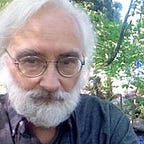Woz and the Founding of Apple
Innovation, Chance, and the Role of the Individual
The year I moved to Silicon Valley to become a full-time editor and writer, Steve Wozniak crashed his private plane on takeoff from Scotts Valley Airport.
With only 50 hours of flight training, Woz was not certified to pilot the Beechcraft A36TC Bonanza, a notoriously challenging aircraft. But he had just become a millionaire due to Apple’s historic IPO, he had recently become engaged, and he had bought an airplane. He was flying high.
Well, not literally. The plane barely got off the runway before it stalled, dropped, crashed through two fences, and rolled to a stop in a roller rink parking lot. The plane was damaged beyond repair. The three passengers luckily sustained only minor injuries, but Woz himself was more seriously injured. His head was battered, he lost a tooth. And something happened to his brain. For five weeks he couldn’t remember the accident or form new memories. It’s called anterograde amnesia, and when he came out of it, he re-evaluated his life.
Woz never fully returned to a leading role in the company he founded. He enrolled in college at UC Berkeley later that year to earn the degree he lacked when he worked for Hewlett-Packard. The lack of that degree had kept him from advancing at HP and ultimately made it easier for him to leave what he called his dream job to start Apple with Steve Jobs.
Capturing the Stories
Paul Freiberger and I conducted one of our interviews with Woz for Fire in the Valley during this time, sitting on the floor in his tiny off-campus apartment. He had enrolled under the name Rocky Raccoon Clark in order to keep a low profile, but the fact that he was in his 30s, knew more about computer hardware and software than the professors, and had his face on magazine covers may have given his classmates a clue about the millionaire in their midst. In any case, Woz got that degree and went back to Apple, but it wasn’t the same. Soon he was embarking on other projects. A universal remote. A music festival. Philanthropy. Segway polo.
Things could have played out differently. Woz might have finished his degree a decade earlier and impressed his bosses at HP and stayed there and developed personal computers or calculators for a big, established company. As it happened, he didn’t, and Apple was the result. Or, later, he might have skipped that fateful flight, stayed at Apple to head up a research division where he would have inspired a generation of brilliant young engineers. As it happened, he didn’t.
The story of the personal computer would have been different if Woz’s story had played out differently. We don’t know what that story would have been, but the fact that an accident can happen to anyone anytime does start one thinking about the sources of innovation, the role of chance, the importance of the unique individual, and the concept of railroading time. History tells us only the story of what happened, but it hints at the other stories, the stories of what might have happened.
When Paul Freiberger and I wrote the first edition of Fire in the Valley back in the early 1980s, we weren’t trying to answer that kind of question. We were spending our days interviewing people like Woz and Jobs and Gates and Allen and Ed Roberts and Lee Felsenstein and Ted Nelson for InfoWorld and our evenings and weekends getting their background stories for our book. We were too immersed in the ongoing revolution for that kind of dispassionate perspective. We were researching personal computer history as it happened.
We just wanted to capture the stories. Today that still feels like the right decision.
The Book: Fire in the Valley
Fire in the Valley is the definitive history of the personal computer, drawn from interviews with the people who made it happen, written by two veteran computer writers who were there as it happened. The completely revised and expanded third edition from the Pragmatic Bookshelf brings the story to its completion, chronicling the end of the personal computer revolution and the beginning of the post-PC era.
“Fire in the Valley was the first, and is still the best, account of the people who created what venture capitalist John Doerr has called the ‘single largest accumulation of wealth in the century.’”
— John Markoff, The New York Times
“We were young. It was a very lucky point in time. [That] something so huge and successful sprang out of it… was a huge surprise.”
— Steve Wozniak
If you enjoyed this article, pick up the book from The Pragmatic Bookshelf:
Through August 31, 2021, use promo code fire_35 to save 35% on Fire in the Valley. Codes are not valid on prior purchases.
The Pragmatic Programmers is an independent publication and has not been authorized, sponsored, or otherwise approved by Apple Inc.
